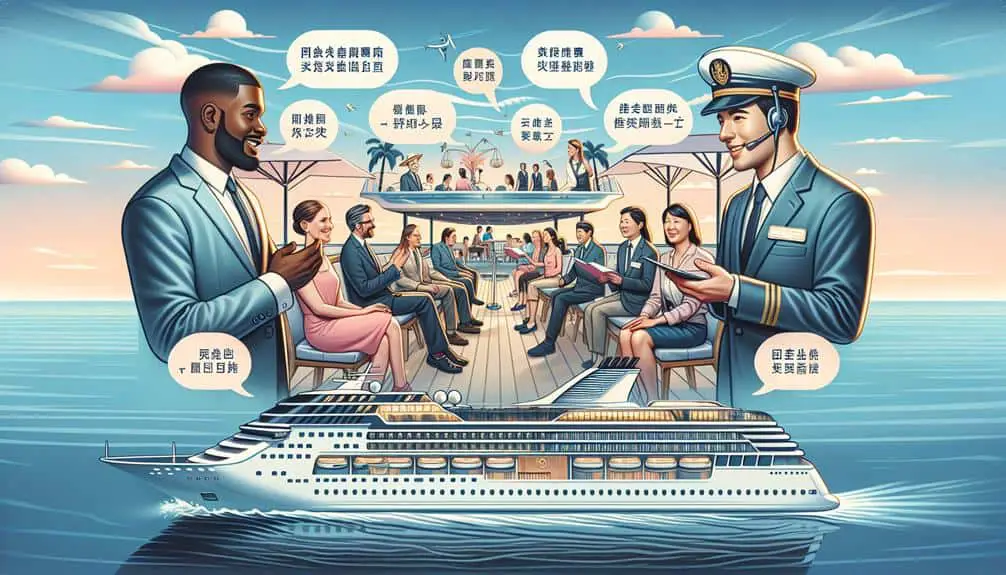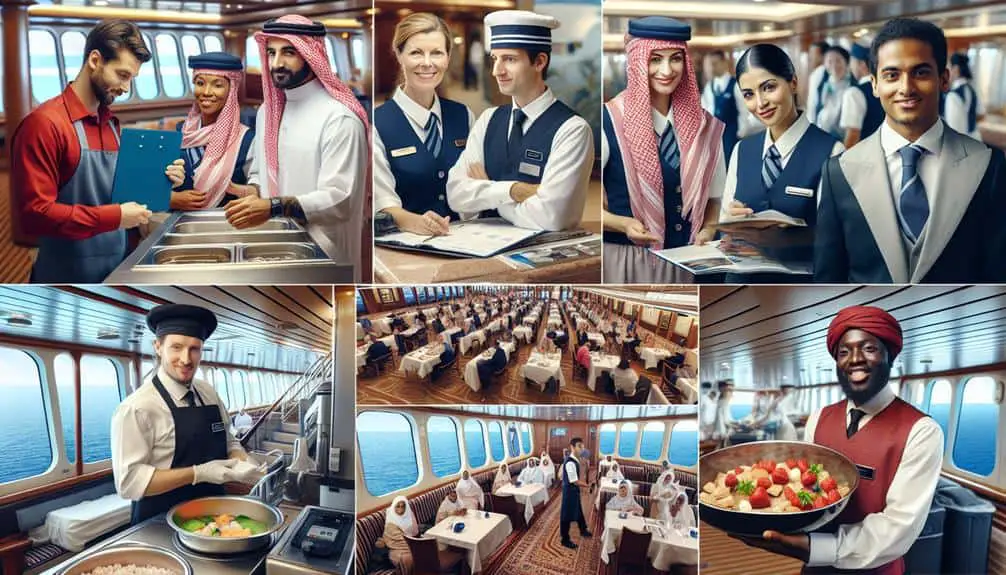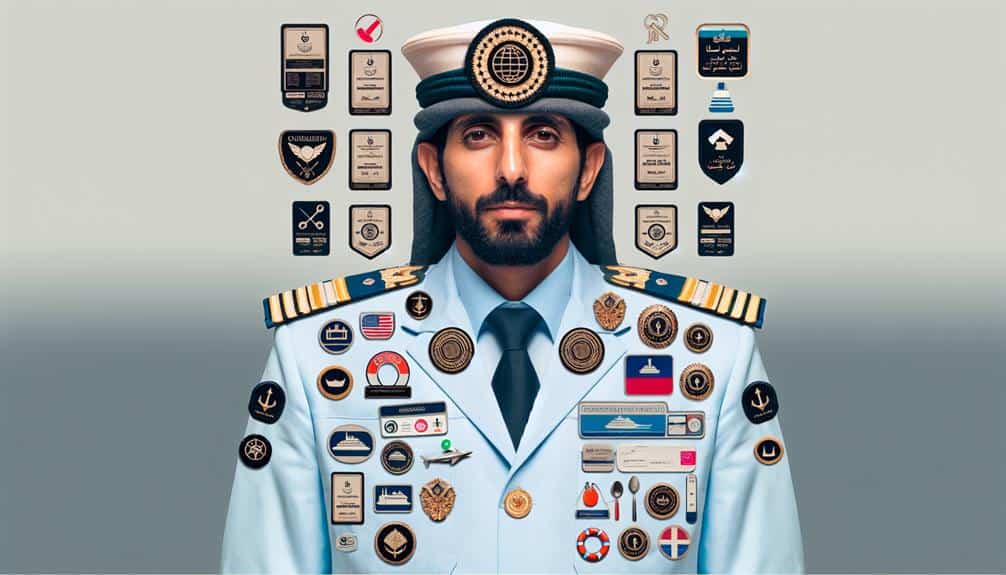When working as cruise staff, you need to be fluent in English and another language like Spanish, French, Mandarin, or German. These languages enhance guest experiences and create a welcoming atmosphere on board. Proficiency in these languages is vital for effective communication and cultural understanding. Master non-verbal communication techniques, emergency protocols, and deliver clear announcements. Strong customer service skills and cultural awareness are key. Speaking multiple languages immerses you in different cultures, improves problem-solving, and boosts career opportunities. Your language skills can truly make a difference for guests and colleagues alike.
Key Points
- Fluency in English is essential for communication with guests and crew.
- Proficiency in a second language like Spanish, French, Mandarin, or German may be required.
- Understanding cultural nuances and norms is crucial for creating a welcoming environment.
- Multilingual staff can enhance guest experience and provide personalized service.
- Clear communication, active listening, and cultural awareness are vital onboard communication skills.
Commonly Required Languages for Cruise Staff
When working as cruise staff, you'll commonly need to be fluent in at least two languages. Language fluency is a crucial requirement due to the diverse passengers onboard. English is a necessity, as it's the primary language for communication. Additionally, a second language is often required, such as Spanish, French, Mandarin, or German, depending on the cruise destination and target clientele. Being fluent in multiple languages not only facilitates clear communication but also enhances the overall guest experience.
Cultural knowledge is equally essential for cruise staff. Understanding the customs, traditions, and etiquette of different nationalities helps in creating a welcoming environment for passengers from around the world. It allows staff to anticipate and cater to the diverse needs of guests, making them feel at home while onboard. Furthermore, cultural awareness enables smoother interactions and fosters respect and appreciation among passengers and crew members. Mastering these linguistic and cultural aspects is crucial for providing exceptional service and ensuring a memorable cruise experience for all.
Language Proficiency Levels for Staff
To excel in your role as cruise staff, it's essential to possess varying levels of language proficiency to effectively communicate with the diverse passengers onboard. Language fluency is vital as it allows you to interact seamlessly with guests from different countries and cultures. Having a high level of proficiency in languages commonly spoken onboard, such as English, Spanish, or Mandarin, can greatly enhance the overall guest experience.
Moreover, cultural awareness is equally important when considering language proficiency levels. Understanding the nuances of different cultures enables you to communicate respectfully and avoid misunderstandings. Being sensitive to cultural differences can help you tailor your interactions to meet the diverse needs and expectations of passengers from around the world.
Onboard Communication Skills
Enhancing your onboard communication skills is key to creating memorable guest experiences and fostering positive relationships with passengers from diverse backgrounds and cultures. To excel in this area, consider the following:
- Non-verbal Communication Strategies: Master the art of body language, facial expressions, and gestures to convey messages effectively without words.
- Cultural Sensitivity: Understand and respect the cultural norms, beliefs, and practices of passengers to guarantee interactions are respectful and inclusive.
- Emergency Communication Protocols: Be well-versed in emergency procedures and communication protocols to handle crises efficiently and keep passengers safe.
- Clear Announcements: Practice delivering clear and concise announcements to make sure that important information reaches all passengers promptly and accurately.
- Active Listening Skills: Develop the ability to listen attentively to passengers' needs, concerns, and feedback, showing empathy and understanding in your responses.
Customer Service Language Requirements
Developing strong customer service language skills is essential for cruise staff to effectively communicate with passengers and enhance their overall experience on board. Language training plays a vital role in preparing cruise staff to interact with guests from diverse backgrounds. This training involves learning not only the basics of different languages but also understanding the nuances of communication styles across cultures.
In addition to language training, cultural awareness is equally important for cruise staff. Being culturally sensitive allows staff to provide a more personalized and respectful service to passengers. Understanding cultural norms, customs, and traditions can help staff anticipate the needs and preferences of guests, leading to a more positive experience for everyone on board.
Multilingual Benefits for Cruise Staff
Understanding and fluently speaking multiple languages can greatly enhance your effectiveness and versatility as a cruise staff member, opening up a world of opportunities for seamless communication and exceptional guest service. Being multilingual provides you with a unique set of advantages that can elevate your performance onboard. Here are some key benefits:
- Cultural Immersion: Speaking different languages allows you to immerse yourself in various cultures, connecting with guests on a deeper level and creating memorable experiences.
- Enhanced Guest Relations: Communicating with guests in their native language shows care and respect, leading to improved guest satisfaction and loyalty.
- Improved Problem-Solving: Multilingual abilities enable you to address issues more efficiently, resolving conflicts and misunderstandings with ease.
- Team Collaboration: Being able to communicate with colleagues from diverse backgrounds fosters better teamwork, enhancing productivity and creating a harmonious work environment.
- Career Advancement: Multilingual skills can set you apart in the industry, opening doors to promotions and opportunities for growth within the cruise line.
Embracing multilingualism not only enriches your personal development but also contributes to the overall success of the cruise operations.
Frequently Asked Questions
Can Cruise Staff Choose Which Languages They Want to Learn or Improve While Working Onboard?
While working onboard, cruise staff have some flexibility in choosing language preferences to learn or improve. Personalized learning opportunities are available to enhance communication skills. This tailored approach can enrich your experience and interaction with guests.
Are There Specific Language Training Programs Provided for Cruise Staff to Enhance Their Language Skills?
Discover the world of language training and staff development on cruise ships. Immerse yourself in immersive programs tailored to improve your skills. Engage with diverse cultures and hone your communication abilities while at sea.
How Important Is Fluency in Sign Language for Cruise Staff Working With Guests Who Are Deaf or Hard of Hearing?
Fluency in sign language is essential for cultural sensitivity and breaking communication barriers with guests who are deaf or hard of hearing. Inclusivity training enhances customer interactions, ensuring all guests feel welcomed and understood.
Do Cruise Staff Receive Additional Language Training for Emergency Situations or Medical Emergencies Onboard?
In the high seas of emergency communication, cruise staff undergo personalized training to navigate medical terminology efficiently. Language preferences are considered, ensuring readiness for any onboard medical emergencies. Your skills are honed for swift responses.
Are There Opportunities for Cruise Staff to Practice Foreign Languages With Guests During Onboard Activities or Events?
Engage in cultural exchange and broaden horizons as a cruise staff member by seizing opportunities to practice foreign languages with guests during onboard events. Enhance communication skills and foster meaningful connections.




